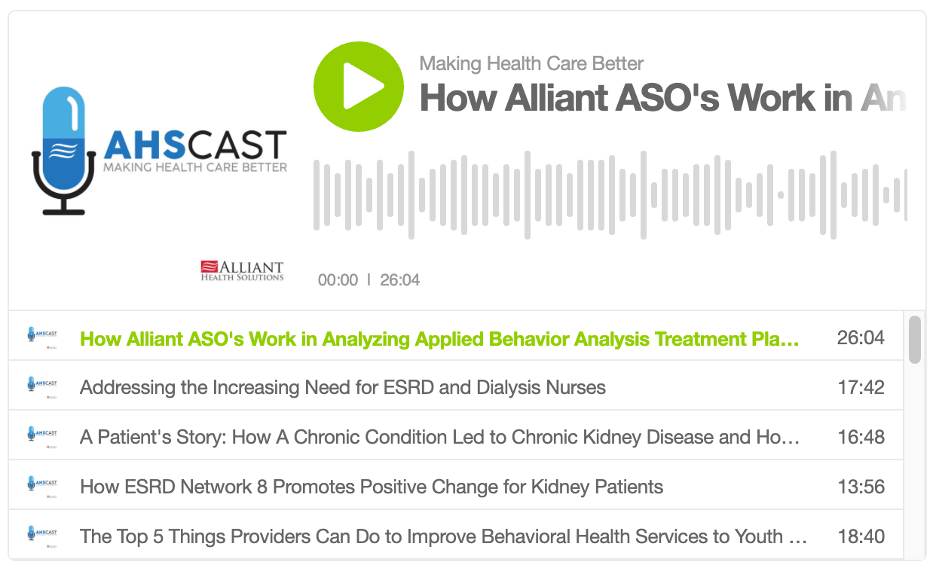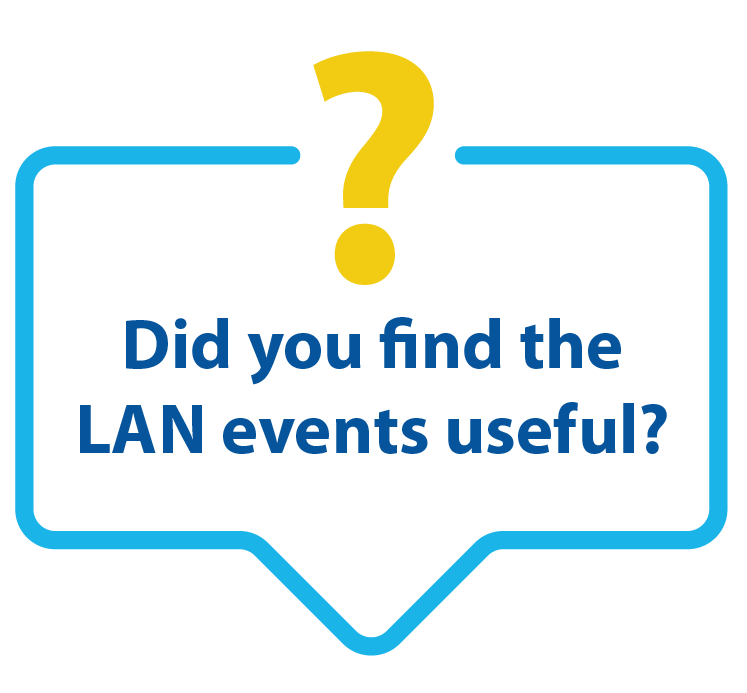|
|
|
|
Please share this email with friends or colleagues using these links:           
(Please do not forward the email as it may impact your subscription settings)
|
|
A monthly newsletter highlighting events and resources for Nursing Homes & Community Coalitions
In This Issue:
|

CMS Unveils More User-Friendly Medicare Website
The Centers for Medicare & Medicaid Services (CMS) unveiled several updates to the Medicare.gov website that make it easier for millions of people who use it to navigate and access information to compare and select health and drug coverage and find providers. Read Article
|
|
|
|
Our team is collecting and curating the essential trainings, events, resources and vaccine updates about COVID-19 and other viruses on our website so you can find the information you need. We've also outlined the essentials below.
View All COVID-19 News & Resources
Training & Resources
- Take 5: Visit the Alliant Health Solutions website to find resources on COVID-19. We are currently working on a series of five-minute educational YouTube videos that focus on the most requested topics related to COVID-19 and the COVID-19 vaccine. Visit Website
The first four videos are ready for you and your staff:
- Take 5: Introductory – How to Use Take 5
- Take 5: Vaccine Eligibility Part 1
- Take 5: Vaccine Eligibility Part 2
- Take 5: Overcoming Refusals
- Visit the Alliant Health Solutions Give the Boost A Shot webpage for up-to-date resources, events, newsletter information and more, including social media graphics and flyers. Visit Website
- Centers for Disease Control and Prevention (CDC) COVID-19 Toolkits – Toolkits on various topics to help you successfully communicate with your audiences. Get Toolkits
- CDC Responder Stories - CDC has thousands of responders supporting the fight against the COVID-19 pandemic. Learn more about their unique stories. Read Responder Stories
- COVID-19 Data Tracker – Maps, charts and data provided by the CDC and updated daily. This information can be used at the facility level to show Community level COVID-19 data and help reduce COVID-19 transmission by staying aware. View Data Tracker
- Visitor Talking Point—Visitor Flyer
- Attention Visitor Flyer
NHSN Updates
Stay up to date on NSHN revisions:
- In May, various revisions to the COVID-19 Vaccination Modules for Healthcare Personnel were released. Read About the Changes
- COVID-19 Vaccination Modules: Understanding Key Term – Released May 23, 2022. Download Modules
Vaccine Updates
Flu Season: Is It Over?
In the United States, flu season occurs in the fall and winter. While influenza viruses spread year-round, most of the time flu activity peaks between December and February, but activity can last as late as May. For up-to-date information on current flu season and activity, Click Here
|
|
|
Leadership Lessons
Words of advice from leaders on the front lines.
This month’s leadership lesson is from Lisa Davies, CPHQ, LNHA, RD, LD, Quality Improvement Manager Alliant QIN-QIO.
Listening Is a Key to Performance Improvement
The skill of listening has been the subject of many leadership books, blogs and podcasts. Robert C. Greenleaf describes listening as one of the 10 characteristics of a servant leader, emphasizing the importance of having a deep commitment to intently listing to others.
Quality improvement, and an organization’s journey to performance excellence, takes leadership, teamwork and a structured approach to listening. In last month’s newsletter, Linda Kluge talked about the “A” in PDSA and how the Act phase is often passed over, which can prevent sustained improvement. This month, I want to go back to the “P” and address how effective listening can set your organization up for success. The planning portion of quality improvement includes:
- Identifying the problem.
- Investigating the root cause of the problem.
- Developing a plan to improve that will resolve the problem.
While opportunities for improvement are often abundant in health care, finding the levers to pull that will have the biggest impact on your customer can be hard to determine. Staff on the front lines are closest to your customers and often recognize early indicators of declining quality. As leaders, we must meet our staff where they are, ask open-ended questions about the process we are investigating, listen to what they are saying and not saying, and acknowledge their contribution to the quality process. Leaders must support a culture of safety by creating an environment where staff feels safe to report errors, near misses or almost errors. We need to listen to what these occurrences might be telling us about gaps in quality of care.
Continue Reading on our Website
Best Practice Corner
Each month Alliant Health Solutions collects exemplar practices from organizations across the seven-state region. Thank you for your leadership, creativity and perseverance.
Alabama Department of Public Health Creates COVID At-Home Test Infographic
The Alabama Department of Public Health created a helpful infographic, “What to Do with Your COVID-19 At-Home Test Result,” that explains when to take an at-home test and what to do after getting the test result. Download Infographic
Georgia Nursing Home Embraces QII Process for Infection Control
Beverly Hamilton, executive director of Savannah Beach Health and Rehab in Tybee Island, Ga., embraced the QII process for infection control for cognitive care residents. An audit was developed with the Georgia Department of Public Health infection preventionists to determine how to serve this challenging population for compliance. In addition to auditing staff engagement in active assistance rather than buying into the “they just can’t be compliant” bias, Beverly also made available a series of options to provide the optimal device for the residents’ ability level. Examples included small open domes to wear between mouth and mask, behind the head mask tamers that avoid ears and maintain placement and a variety of standard masks for tactile differences. If none of these are tolerated, an impaired resident is given cloth masks or a face shield. Trials and results were each documented in the record. Note: The facility is aware that cloth masks and face shields provide suboptimal protection, but they afford more than no protective equipment at all.
North Carolina Approves Extended Child Care Food Assistance Benefits
Starting in late May, North Carolina’s youngest children who are eligible for food assistance benefits will receive extra monthly benefits tied to the COVID-19 pandemic for the 2021-2022 school year. North Carolina is among the first states in the nation to receive approval from the U.S. Department of Agriculture for a 2021-2022 Child Care Pandemic Electronic Benefits Transfer food assistance program. Read More
Do you have a promising practice to share? Please reply to this email and we will feature you in an upcoming issue.
Health Equity Corner
Health Equity 101 and How It Impacts You
Health equity is achieved when every person has the opportunity to attain his or her full health potential and no one is disadvantaged from achieving this potential because of social position or other socially determined circumstances. In a recent episode of Alliant’s Making Health Care Better podcast, Alliant’s health equity lead, Rosa Abraha, MPH, shares how health inequities impact all. Listen Now | Watch Video
|
AHSCAST - Making Health Care Better
 |
Everyone deserves quality health care.
Tune into the Alliant Health Solutions Making Health Care Better podcast every other Thursday as they interview guests committed to making health care better. If you are a health care consumer, provider, insurer, system or consultant, this is the podcast for you. View All Podcast Episodes |
|
Events
|
Upcoming Events
Save the Date for Our Twitter Chat
Alliant Health Solutions is hosting our first live Twitter chat on Tuesday, June 28, from 11 a.m. to 3 p.m. ET. The topic will focus on decreasing hospital and facility readmissions. A new question will be tweeted at the top of each hour. Participate and follow the chat using #ChatWithAlliant.
Columbia Suicide Severity Rating Scale Training (C-SSRS)
Wednesday, June 8 at 9:30 a.m. ET or Tuesday, June 14 at 1:30 p.m. ET (90 min.)
The Columbia Suicide Severity Rating Scale (C-SSRS) is widely recognized as a gold standard and innovative suicide risk screening tool. It has been implemented in many systems across the United States and abroad. Reports indicate a rise in suicidal ideations and attempts during the COVID-19 pandemic. Join Alliant Health Solutions in this 90-minute session to learn how to keep communities safe through early detection, intervention and follow-up. View Agenda
June 8 training - Register Here | June 14 training - Register Here
Upcoming Learning & Action Network (LAN) Events
- Combined Community Coalitions and Nursing Homes: Tampa General Hospital PFAC; Enhancing Inclusion of the Patient and Care Partner Voice To Reduce Readmissions
Thursday, June 23 at 12:30 p.m. ET / 11:30 a.m. CT (30 min.)
Readmissions on the rise? Learn from a patient advisory coordinator and a patient and family advisor about strategies and project ideas for engaging patient and family advisors in readmission prevention and reduction initiatives.
Register Now
Register for Upcoming LAN Events
Last Month's Learning & Action Network (LAN) Events
- Combined Community Coalitions and Nursing Homes: Strategies To Support Care Partners and Improve Care Transitions To Reduce Readmissions
Recorded on May 26
In this webinar, Jennifer Heston-Mullins, Ph.D., LISW, provided an overview of Miami University’s Our Family, Our Way communication and care coordination resources for caregiving families to help identify gaps and conflicts. Alliant Health Solutions partnered with Dr. Heston-Mullins to create an 8-minute video overview of the Our Family, Our Way resources. The overview can be shared with facility leadership teams or frontline staff who will be utilizing the resources.
In addition, Mark Tole, Ph.D., RN, from UNC-Chapel Hill, shared how lessons learned from the Connect-Home transitions of care pilot can lead to an improved transitional care experience.
When used separately or together, these tools can help you reduce readmissions.
View Slides | Watch Our Family, Our Way Overview Video
Watch Previous LAN Events and Bite-Size Learnings

Were You Able to "Use Tomorrow" What You Heard During the LAN Events?
If Yes, Click Below.
Nursing Homes LAN Attendees: Click here
Community Coalition LAN Attendees: Click here
Upcoming Infection Prevention Shop Talks
- June 2022 Shop Talk Call
Thursday, June 16 at 2 p.m. ET / 1 p.m. CT (60 min.)
Join the Alliant Health Solutions Patient Safety Team to get updates on the National Healthcare Safety Network (NHSN) system and CMS requirements. We will review the new Event-Level COVID-19 Vaccination forms that are now built into the NHSN application to manage person-level vaccination data. In addition, there will be a live question and answer session to help with your immediate needs. Submitting data accurately into NHSN will help you more confidently plan your risk assessments and quality improvement initiatives.
Register Now
|
Resources
|
Post-Traumatic Stress Disorder (PTSD) Awareness Month
There are currently about 8 million people in the United States with post-traumatic stress disorder (PTSD). Even though PTSD treatments work, most people who have PTSD don't get the help they need. June is PTSD Awareness Month. Help us spread the word that effective PTSD treatments are available. Everyone with PTSD—whether they are veterans or civilian survivors of sexual assault, serious accidents, natural disasters or other traumatic events—needs to know that treatment works and can lead to a better quality of life. Help Raise PTSD Awareness
PTSD is a disorder that develops in some people who have experienced a shocking, scary or dangerous event. Signs and symptoms include:
- Flashbacks—reliving the trauma over and over, including physical symptoms like a racing heart or sweating
- Bad dreams
- Frightening thoughts
- Staying away from places, events, or objects that are reminders of the traumatic experience
- Avoiding thoughts or feelings related to the traumatic event
- Being easily startled
- Feeling tense or on edge
- Having difficulty sleeping
- Having angry outbursts
- Trouble remembering key features of the traumatic event
- Negative thoughts about oneself or the world
- Distorted feelings like guilt or blame
- Loss of interest in enjoyable activities
Learn More about PTSD and Treatment
 |
Access FREE expert guidance on this topic: Contact Tanya Vadala |
|
Updates in NHSN as of May 24, 2022
LTCF COVID-19 Module
Resident Impact and Facility Capacity Pathway:
Several data fields will be removed from this pathway. Please see the list below for the elements to be removed.
- COVID-19 test type
- Vaccine manufacturer for primary vaccine series
- Vaccine manufacturer for additional or booster doses
- COVID-19 re-infections, including symptomatic and asymptomatic
- Respiratory illness
- Influenza and COVID-19
The following questions will also be removed:
- Since the last date of data entry in the Module, has your LTCF performed SARS-CoV-2 (COVID-19) viral testing on residents and/or staff?
- During the past two weeks, on average, how long did it take your LTCF to receive SARS-CoV-2 viral test results from NON-point-of-care tests?
The Vaccination Status section will also appear differently. There will only be three options for primary vaccination status types, as listed below:
- Not vaccinated
- Partial vaccination
- Complete primary vaccination series
The Additional or Booster Vaccination data field will remain on the form, and two new subcategories for Booster doses will be added:
- One booster
- Two or more boosters
NOTE: Facilities will also report data regarding the up-to-date vaccination status of residents that test positive for COVID-19. This surveillance data element is designed to assess vaccine effectiveness in promoting an immune response to SARS-CoV-2 (COVID-19). Therefore, it may differ from the CDC’s clinical considerations guidance document.
For reference, review the CDC definition of up-to-date here. Please note that this definition is subject to change based on CDC recommendations.
An additional question will be added to address personal protective equipment (PPE) shortages within facilities. Facilities will indicate if they will no longer have any PPE supply items in seven days. If the facility selects “Yes,” they will move on to indicate the specific items they need. If the facility selects “No,” they do not need to indicate any specific supply items.
Staff and Personnel Impact Pathway:
Several data fields will be removed from this pathway. Please see the list below for the elements to be removed.
- COVID-19 test type
- COVID-19 re-infections, including symptomatic and asymptomatic
- Respiratory illness
- Influenza and COVID-19
- The section regarding staff shortages will also be revised to include one question regarding staffing shortages. If the facility selects “yes,” they will need to indicate which specific staffing roles they are experiencing a shortage.
Supplies and Personal Protective Equipment (PPE) Pathway:
This Surveillance Pathway will be removed, and facilities will no longer have to report data within the pathway.
Therapeutics Pathway:
No updates
Weekly NHSN COVID-19 Vaccination Data Modules:
Several changes to simplify reporting will be made to the COVID-19 Vaccination Modules for residents and health care personnel. See below:
Simplifications
- COVID-19 vaccination data will no longer be reported by vaccine manufacturers for questions on primary vaccine series and additional/booster doses.
- Questions on vaccine supply will be removed.
- Completing monthly reporting plans for COVID-19 vaccination modules in the Long-Term Care Facility Component will no longer be required. Instead, upon saving or uploading data, users will agree to the following:
- The data reported are consistent with definitions outlined in NHSN surveillance protocols (including tables of instructions and frequently asked questions).
- The data will be sent to the Centers for Medicare and Medicaid Services (CMS) to fulfill CMS quality reporting requirements (when applicable).
Additions
- Adding a question for facilities to report the cumulative number of individuals who are up to date with COVID-19 vaccination.
- Adding two fields to question #4 to report the cumulative number of individuals who received only one booster dose and two or more booster doses of the COVID-19 vaccine. (Note: For residents only)
Tip: Using the new event-level COVID-19 vaccination forms in NHSN’s Long-Term Care Facility Component can simplify the tracking and reporting of data on multiple booster doses and up-to-date vaccination status. For questions about any of these updates, email the NHSN Helpdesk at NHSN@cdc.gov with the subject line identifying the topic of the message.

|
Essential Resources to Help You Navigate NHSN
Weekly COVID-19 Vaccination Data Reporting & Training
Effective August 23, report health care personnel and residents who are eligible to receive the COVID-19 booster (additional vaccine).
Training slides (reference slides 9 & 20-23)
Who is eligible for the booster? Reference the CDC website for current considerations for use of an additional COVID-19 dose.
Watch Our NHSN Shop Talk Shorts Series!
We know you're busy. Our new video series answers the most common questions we receive regarding navigating NHSN in a brief way. Available videos cover the following topics:
View NHSN Shop Talk Video Series
|
 |
Access FREE expert guidance on this topic: Contact Melody Brown |
|
Keep Cataracts in Sight for People with Chronic Diseases
Help your patients keep an eye on the development of cataracts and vision loss during Cataract Awareness Month in June. Cataracts are the leading cause of vision loss in the United States and affect over 24 million people. Vision loss can negatively impact a person’s quality of life, including physical and mental health. The loss of vision can foster feelings of loneliness, worry, anxiety and fear; lead to social isolation; influence the development of depression, and impact self-care ability. Since cataracts develop progressively over several years, they are often not detected until ocular changes begin to cause symptoms that affect a person’s vision and activities of daily living. Individuals with chronic conditions like diabetes are five times more likely to develop cataracts. The CDC estimates that 32% of adults over 40 with diabetes also have cataracts. The risk of developing cataracts increases with older age, longer duration of diabetes and poor glucose control.
Steps you can take to help your patients keep cataracts in sight:
- Help patients identify the signs and symptoms of cataracts early:
- Cloudy or blurry vision
- Trouble distinguishing between dark and light colors
- Needing brighter lighting to read
- Difficulty seeing clearly at night
- Seeing a halo, glare, or starbursts around lights
- Experiencing double vision
- Finding general lighting and sunlight too bright
- Requiring new prescriptions for eyeglasses or contacts repeatedly within a year
- Refer patients to an ophthalmologist that can further encourage them to:
- Protect eyes by wearing corrective eyewear that offers protection from ultraviolet rays
- Get a dilated eye exam
- Yearly if they have diabetes or high blood pressure
- Every 1-2 years if they have a family history of glaucoma, are over age 60, or are African American and over age 40
- Assess significant changes in their vision
- Refer patients to a certified diabetes care and education specialist (CDCES) that can further encourage them to:
- Manage blood sugar levels with a personalized self-management care plan, including specific daily exercise, healthy eating and medication management goals
- Refer patients to a registered dietitian nutritionist who can further encourage them to:
- Eat a diet rich in leafy green vegetables, fruits and healthy fats
- Refer patients to a behavioral health specialist who can further encourage them to:
- Participate in smoking cessation counseling and treatment programs
- Screen patients with vision loss for depression and anxiety
Provider resources:
Patient resources:
|
|
New Post-Readmission Patient and Care Partner Interview Tool
Gathering the patient/resident and care partner perspective is an essential element of a comprehensive cross-setting readmission retrospective review, root cause analysis and readmission reduction strategy. Alliant Health Solution’s community coalition and nursing home teams worked with our Beneficiary and Family Advisory Council to create a two-page interview tool that provides a framework for gathering the consumer perspective on factors that may have contributed to a readmission from a nursing home or skilled nursing facility (SNF). This tool can be adapted for use with patients readmitted from home with or without home health services. Download Readmission Patient and Care Partner Interview Tool
New Delirium Bite Size Learning Case Studies
Alliant Health Services partnered with a delirium subject matter expert, Christine M. Waszynski, DNP, APRN, GNP-BC, FAAN, coordinator of Inpatient Geriatric Services at Hartford Hospital in Hartford, Conn. and past president of the American Delirium Society, to record a cross-setting delirium case study. The case study can be used for staff education to improve the prevention, identification and management of delirium in acute and long-term care settings. The new case study, recorded in two segments, is part of a comprehensive delirium toolkit that can be viewed on our YouTube delirium playlist at the following links: Episode 1 | Episode 2
Supporting Caregivers with Free Family Meeting Planning and Calendar Resources
Our Family, Our Way is a communication and care coordination process developed by Miami University’s Scripps Gerontology Center to help caregiving families think and talk about caregiving. Helping families work through who will do what, where and when it will happen, and how it will be accomplished can positively impact the quality of life for individuals with care needs and their care partners. In addition, identifying and proactively addressing gaps in care can reduce emergency department visits and rehospitalizations. The online tools and resources are free to download and use or use virtually with multiple family members.
Alliant Health Solutions partnered with Scripps Gerontology to create an eight-minute video overview of the tools and resources and navigating the website. In addition, Alliant Health Solutions senior quality advisors and hospital and long-term care association partners are available to assist with implementing these resources in your facility or health system. Learn more about Our Family, Our Way in our May LAN event.
NCRN COVID-19 Resources
Alliant Health Solutions is a strategic partner in the Morehouse School of Medicine National COVID-19 Resiliency Network (NCRN) in mitigating the effects of COVID-19. Check out two of our new resources below:
|
AHRQ Seeks Nursing Homes for Pilot Study of the Workplace Safety Supplemental Item Set
The Agency for Healthcare Research and Quality (AHRQ) is developing a Workplace Safety Supplemental Item Set for the Surveys on Patient Safety Culture (SOPS) Nursing Home Survey. Given the foundational importance of workplace safety as a precondition for patient safety, AHRQ is developing a survey item set to help nursing homes identify and improve factors associated with workplace safety. The Workplace Safety Supplemental Item Set will assess how nursing homes’ organizational culture supports workplace safety. The new supplemental item set can be administered optionally at the end of the SOPS Nursing Home Survey. AHRQ will build this new workplace safety measure upon its existing and highly successful SOPS program.
Participate in the Pilot Study
If selected, participating nursing homes will receive:
- Free survey administration of the SOPS Nursing Home Survey with the Workplace Safety Supplemental Item Set to nursing home staff in July/August 2022.
- Feedback reports comparing their results with other pilot sites.
- The option to have findings included in the next SOPS Nursing Home Database.
Timeline
The timeline of the pilot study is:
- Spring/Summer 2022: Recruitment of nursing homes and administration of the SOPS Nursing Home Survey with Workplace Safety Supplemental Item Set.
- Fall 2022: Participating nursing homes will receive survey feedback reports.
- Early 2023: Release of the Nursing Home Workplace Safety Supplemental Item Set and Pilot Study Results.
For more information, email WorkplaceSafety@westat.com or call 1-855-390-244. Read More
Circle Back Process To Improve Care Transitions and Reduce Readmissions
Improved communication between care settings is an evidenced-based best practice for reducing readmissions, improving customer satisfaction and reducing provider burden across the continuum of care. Alliant Health Solution’s Circle Back Tool consists of six questions that, when discussed consistently within 24-72 hours of transfer from a hospital to an SNF, can identify opportunities to improve the care transitions process and allow providers to work collaboratively to address any newly identified or increased risks for readmission. Download Circle Back Interview Tool
Changing Talk: Online Training (CHATO) to Reduce Behavioral Symptoms
Researchers from the University of Kansas School of Nursing are seeking nursing homes nationwide to participate in an NIH-funded research study testing a new online version of the evidence-based Changing Talk (CHAT) communication training program. CHAT educates staff about reducing elderspeak (infantilizing communication) and results in reduced behavioral symptoms and the need for psychotropic medication for residents with dementia. The new online version (Changing Talk: Online Training (CHATO)) consists of three one-hour interactive online modules that provide flexible and accessible access for staff. There is no cost, direct-care staff can earn three contact hours, and staff gets a Certificate of Completion for their file.
Benefits include:
- A person-centered approach.
- Education about elderspeak and better communication strategies.
- Reduction in resistance to care and other behavioral symptoms in residents with dementia.
- Reduction in the need for psychotropic medication.
- Convenient, online educational format for busy nursing homes.
- Qualifies for CMS dementia care training hours requirements.
- A free, non-pharmacological, evidence-based intervention is an excellent addition to a Quality Improvement Plan.
Learn More | Download Pilot Research and CHATO National Trial Information
|
Members of the Beneficiary & Family Advisory Council are our partners in making health care better. To join us in this important work, contact Mel Brown or submit this referral form.
Browse resources our council has worked on below:
Pneumococcal Vaccine Timing for Adults
The CDC has updated its pneumococcal vaccination timing for adults. Health care providers are asked to make sure their patients aged 65 and older are up to date with their pneumococcal vaccination. Read More
|
For archived issues:
Visit the News & Announcements section of the Alliant Health Solutions website.
 |
For more information about Alliant Health Solutions:
www.quality.alliantquality.org
Share this email with a friend or colleague:  
|
Connect with us!
    Click here if you'd like to share your corporate profiles with us and we'll connect with you!
Click here if you'd like to share your corporate profiles with us and we'll connect with you!
|
 |
|
|
|
|